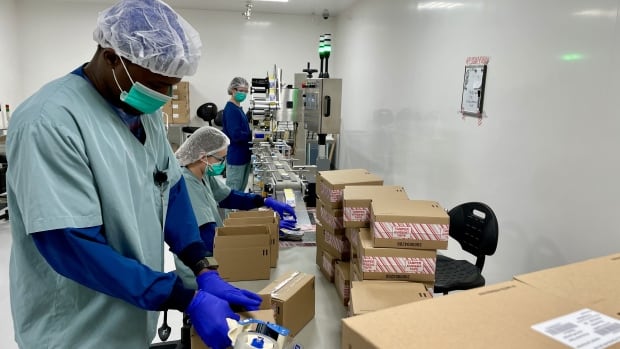
Touring around FIGR’s massive production facility in Charlottetown, it’d be easy to assume the P.E.I.-owned cannabis company is thriving.
Everywhere you turn, employees are busy filling bags and cartridges with cannabis flowers and oil, or loading products into boxes, that will wind up in stores right across the country.
But as busy as the company and its 130 employees are, and as solid as sales have been, the CEO said it’s hardly translating into a profit.
“If you look across the industry, I don’t know that you’ll find a licensed producer reporting a profit at this point. And as a local company competing in the industry, we’re certainly not immune to that either,” said Alex Smith, FIGR’s CEO. “The industry is not viable right now for licensed producers.”
High taxes, low prices
Smith said the biggest issue is the excise tax imposed on cannabis producers. For every gram of cannabis they sell to distributors, they owe the government $1, or 10 per cent of the per gram price — whichever is greater.
Since pot became legal four years ago, he said, producers across Canada have had to lower their prices to compete with illegal growers and sellers, who don’t face the same overhead costs or taxes.
When cannabis products first hit shelves, many licensed producers started selling their products for $7-8 per gram. Now, most are selling for $4 or less per gram, and $1 of that is lost to the excise tax.
“So what that results in, is a tax that is 25-35 per cent of our revenues, which is restrictive,” he said. “If you look at any business, giving up 25-35 per cent of revenues, it’s simply not a sustainable business model.”

Adding to the challenge? The rising cost of just about everything — except cannabis.
“It’s kind of a double whammy. Our costs are going up. But we can’t simply raise our prices or consumers will go to that unregulated and potentially unsafe area of the market, and return to those channels,” said Smith.
Cannabis group lobbying Ottawa
They’re all issues the Cannabis Council of Canada has been raising in Ottawa this week, with members of parliament and federal officials.
The council’s president, George Smitherman, said many cannabis businesses across the country are on the brink of closure.
His council’s calling on the federal government to streamline a review of the Cannabis Act, including the excise tax. In the meantime, it wants Ottawa to drop a separate 2.3 per cent regulatory tax that producers have to pay.
“We’re saying to government, ‘back off a little in the short term, and collectively we can grow the pie together,'” said Smitherman. “Otherwise, we run the risk, especially in a lot of parts of rural Canada, where cannabis has been associated with economic renewal, of seeing some setbacks.”

While FIGR’s CEO said the company has avoided laying off any employees, it has started eliminating some positions as people have left them.
In fact, over the past two years, staffing numbers at FIGR have dropped from 160 to 130.
“We’ve had to make very difficult decisions — temper our growth, reduce head count over time just to remain competitive in this space,” he said.
About a year ago, a group of local investors took over the company. Smith said they’re determined to turn it into a profitable business.
“We have a team to produce something very special on the Island. We just need the support from government to do that.”

